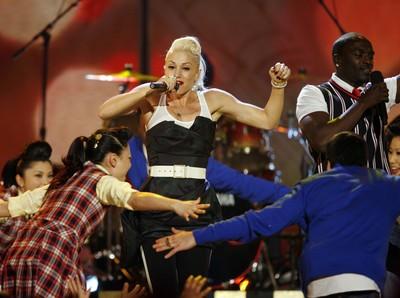Grit vs. Glamour

When Gwen Stefani first burst into the public eye, she was throwing her fists at the camera and karate kicking the air, a tomboy in a half-shirt whom you wouldn’t want to arm wrestle.
She carried herself like a bleach blonde, modern day update of Rosie the Riveter, a self-consciously tough chick who hid her curves behind baggy pants and didn’t want to be one of the boys as much as best them.
"I’m just a girl, all pretty and petite / So don’t let me have any rights," she purred sardonically in the video for "Just a Girl," the first hit for her band, No Doubt. It was a feminine call to arms smack in the middle of the grunge era, which dripped with more testosterone than an NFL locker room.
That was back in 1994, the preface of Lilith Fair’s reign, when assertive female artists began to earn a measure of equal time in crowded amphitheaters across the country.
But Stefani was different from the cool, slightly detached assertiveness of the likes of Sarah McLachlan and Sheryl Crow — she fronted a band of sweaty dudes and often seemed more rough and tumble than them all.
And she did it without compromising her femininity: Stefani was still a sex symbol, but an identifiable one, with traces of dirt beneath her fingernails and an aura of feminine machismo that rendered girl power something more than just a catchphrase.
As a result, a generation of young women related to her in a way that they never would with Britney or Christina, two pinups who always seemed like pushovers no matter how brazen their songs may be.
Now, a little more than a decade later, the line between Stefani and her air-brushed peers has been blurred a little bit: She’s become the most stylized of pop stars, trading in those track pants for designer threads and a bejeweled sheen.
"A lot of things have changed, but I’m mostly the same" she sings on her latest disc, "The Sweet Escape," still clinging to her girl-next-door bona fides, which first defined her. "I’m just an Orange County Girl / Livin’ in an extraordinary world."
Once a grounding presence amid all of pop’s superficialities, Stefani’s become larger than life, a perpetual cover girl who now cops Michelle Pfeiffer’s sheer, shiny look from "Scarface."
Having not recorded an album with No Doubt since "Rock Steady" in 2001, Stefani’s spent the past few years as a solo artist, dropping a pair of hit-or-miss dance pop records that pointedly revel in whimsy and camp.
Stefani’s solo debut, 2004’s "Love.Angel.Music.Baby.," was a love letter to New Wave synth pop and buzzing electro, a chaotic, impulsive disc that seemed like a collection of random thoughts.
Its follow-up, "Escape," often sounds like the assortment of leftovers that it mostly is — it’s less fun, less focused, which is really saying something considering how scattershot "Love" was.
Now, it’s no discredit to Stefani that she’d want to cut loose with some deliberately frivolous tunes that have little more than the dance floor in mind, no crime that she’d put high style over high art for a minute.
After all, this is a lady who’s spent much of her time of late launching a pair of fashion lines, L.A.M.B. and Harajuku Lovers, which will reportedly rake in $90 million in sales this year.
But listening to "Escape," it’s hard not to pine for the ballsy cannonball who once ruled the charts with a smirk and a thrown elbow or two, that leering firebrand who used to trade in grit as much as glamour.
"I’m just a girl, what’s my destiny?" Stefani questioned so long ago on "Just A Girl." "What I’ve succumbed to is making me numb."
She’s not the only one.